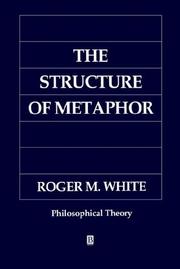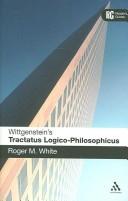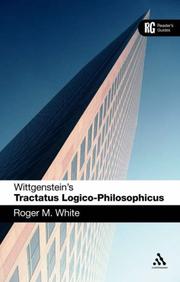| Listing 1 - 6 of 6 |
Sort by
|

ISBN: 0631168117 Year: 1996 Volume: *2 Publisher: Oxford Blackwell
Abstract | Keywords | Export | Availability | Bookmark
 Loading...
Loading...Choose an application
- Reference Manager
- EndNote
- RefWorks (Direct export to RefWorks)
Philosophy of language --- Literature --- Metafoor --- Metaphor --- Métaphore --- Parabole --- Semantics (Philosophy) --- Semantiek (Filosofie) --- Sémantique (Philosophie) --- Intension (Philosophy) --- Logical semantics --- Semantics (Logic) --- Semeiotics --- Significs --- Syntactics --- Unified science --- Language and languages --- Logic, Symbolic and mathematical --- Logical positivism --- Meaning (Psychology) --- Philosophy, Modern --- Semiotics --- Signs and symbols --- Symbolism --- Analysis (Philosophy) --- Definition (Philosophy) --- Figures of speech --- Reification --- Metaphor. --- Semantics (Philosophy).
Book
ISBN: 9781409400424 9781409400363 9781409403630 1409403637 1409400360 1409400425 1315241862 1282545256 9786612545252 1351896326 9781315241869 9781351896320 9781351896313 1351896318 9781351896337 1351896334 Year: 2010 Publisher: Farnham Ashgate
Abstract | Keywords | Export | Availability | Bookmark
 Loading...
Loading...Choose an application
- Reference Manager
- EndNote
- RefWorks (Direct export to RefWorks)
A fundamental question for theology is the question how we are to understand the claims that we make about God. The only language we can understand is the language we use to talk about human beings and their environment. How can we use that language to talk about God while respecting the infinite difference between God and humanity? The traditional answer has been to appeal to the concept of analogy. However, that appeal has been interpreted in widely different ways. This book aims to clarify the question and this answer by an analysis of the concept. It begins with an exploration of the way the concept was evolved by Aristotle out of Greek mathematics as a technique for comparing "things that were remote"; followed by a critical examination of three very different classical accounts of the way religious language works: those of Thomas Aquinas, Immanuel Kant and Karl Barth. The book finally investigates the way in which analogy could be applied to answer the question initially posed - how is it possible to use human language to talk about God. This is a question of fundamental significance for the whole of religion and theology, concerning as it does our whole understanding of what we mean when we talk about God.
Religious studies --- Analogy (Religion) --- Knowledge, Theory of (Religion) --- Philosophical theology. --- God (Christianity) --- Analogie (Religion) --- Théorie de la connaissance (Religion) --- Théologie philosophique --- Dieu (Christianisme) --- 291.1 --- 21*015 --- God --- -Metaphysics --- Misotheism --- Monotheism --- Religion --- Theism --- Theology, Philosophical --- Philosophy and religion --- Theology, Doctrinal --- Religious knowledge, Theory of --- Godsdienstfilosofie --- Theologie en taal --- Christianity. --- Philosophy --- -Godsdienstfilosofie --- 21*015 Theologie en taal --- 291.1 Godsdienstfilosofie --- -Theology, Philosophical --- Théorie de la connaissance (Religion) --- Théologie philosophique --- Epistemology, Religious --- Religious epistemology --- Philosophical theology --- Metaphysics --- Christianity --- Trinity

ISBN: 0826486177 Year: 2006 Publisher: London Continuum
Abstract | Keywords | Export | Availability | Bookmark
 Loading...
Loading...Choose an application
- Reference Manager
- EndNote
- RefWorks (Direct export to RefWorks)

ISBN: 0826486185 Year: 2006 Publisher: New York (N.Y.) Continuum
Abstract | Keywords | Export | Availability | Bookmark
 Loading...
Loading...Choose an application
- Reference Manager
- EndNote
- RefWorks (Direct export to RefWorks)
Book
ISBN: 1108769519 1108850952 1108851657 1108477283 Year: 2021 Publisher: Cambridge : Cambridge University Press,
Abstract | Keywords | Export | Availability | Bookmark
 Loading...
Loading...Choose an application
- Reference Manager
- EndNote
- RefWorks (Direct export to RefWorks)
In On the Origin of Species (1859), Charles Darwin put forward his theory of natural selection. Conventionally, Darwin's argument for this theory has been understood as based on an analogy with artificial selection. But there has been no consensus on how, exactly, this analogical argument is supposed to work - and some suspicion too that analogical arguments on the whole are embarrassingly weak. Drawing on new insights into the history of analogical argumentation from the ancient Greeks onward, as well as on in-depth studies of Darwin's public and private writings, this book offers an original perspective on Darwin's argument, restoring to view the intellectual traditions which Darwin took for granted in arguing as he did. From this perspective come new appreciations not only of Darwin's argument but of the metaphors based on it, the range of wider traditions the argument touched upon, and its legacies for science after the Origin.
Breeding. --- Natural selection. --- Darwin, Charles, --- Critism, interpretation, etc. --- Darwinism --- Selection, Natural --- Genetics --- Variation (Biology) --- Biological invasions --- Evolution (Biology) --- Heredity --- Selection, Artificial --- Inbreeding --- On the origin of species. --- On the origin of species --- Criticism, interpretation, etc. --- Darwin, Charles, Robert
Book
ISBN: 9781108477284 9781108708524 9781108769518 Year: 2021 Publisher: Cambridge Cambridge University Press
Abstract | Keywords | Export | Availability | Bookmark
 Loading...
Loading...Choose an application
- Reference Manager
- EndNote
- RefWorks (Direct export to RefWorks)
"What can the actions of stockbreeders, as they select the best individuals for breeding, teach us about how new species of wild animals and plants come into being? Charles Darwin raised this question in his famous, even notorious, Origin of Species (1859). Darwin's answer - his argument by analogy from artificial to natural selection - is the subject of our book. We aim to clarify what kind of argument it is, how it works, and why Darwin gave it such prominence. As we explain more fully in our Introduction, we believe that the argument becomes much more intelligible when set, contextually, in a story stretching from classical Greek mathematics to modern evolutionary genetics: a long story, and a broad one too, encompassing everything from Darwin's earliest notebook theorising on the births and deaths of species, to agrarian capitalism as a distinctive form of economic life, to shifting Western reflections on art-nature relations"--
Breeding. --- Natural selection. --- Darwin, Charles, --- Critism, interpretation, etc.
| Listing 1 - 6 of 6 |
Sort by
|

 Search
Search Feedback
Feedback About UniCat
About UniCat  Help
Help News
News